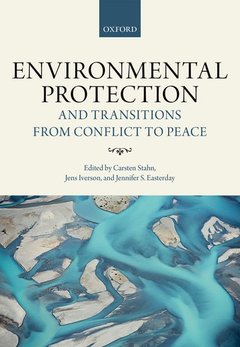Description
Environmental Protection and Transitions from Conflict to Peace
Clarifying Norms, Principles, and Practices
Coordinators: Stahn Carsten, Iverson Jens, Easterday Jennifer S.
Language: English
Subject for Environmental Protection and Transitions from Conflict...:
Publication date: 10-2017
512 p. · 19.6x25.6 cm · Hardback
512 p. · 19.6x25.6 cm · Hardback
Description
/li>Biography
/li>
This is an open access title available under the terms of a CC BY-NC-ND 4.0 International licence. It is free to read at Oxford Scholarship Online and offered as a free PDF download from OUP and selected open access locations. Environmental protection is fundamental for the establishment of sustainable peace. Applying traditional legal approaches to protection raises particular challenges during the transition from conflict to peace. In the jus post bellum context, protection of the environment and natural resources needs to be considered in tandem with a broad range of simultaneously applicable normative frameworks, such as human rights, transitional justice, arms control/disarmament, UN law and practice, development, and domestic law. While certain multilateral environment agreements, such as the Convention Concerning the Protection of the World Cultural and Natural Heritage protect the environment; international humanitarian law and international criminal law continue to treat environmental protection largely from an anthropocentric perspective. This book is the first targeted work in the legal literature that investigates environmental challenges in the aftermath of conflict. Addressing these challenges, it brings together academics, policy-makers, and practitioners from different disciplines to clarify policies and practices of environmental protection and key normative frameworks. It draws on experiences and practices in post-conflict settings to specify substantive principles and techniques to remedy and prevent harm.
Carsten Stahn is Professor of International Criminal Law and Global Justice at Leiden University and Assistant Professor at the Groitus Centre for International Legal Studies. He is the author of The Law and Practice of International Territorial Administration:Versailles to Iraq and Beyond. He has published articles on international criminal law and transitional justice in leading international journals (American Journal of International Law, European Journal of International Law, Journal of International Criminal Justice, Harvard International Law Journal), and edited several collections of essays in the field. Jens Iverson is a Researcher for the Jus Post Bellum project and an attorney specializing in public international law. A member of the California Bar, the Thurston Society, and the Order of the Coif, he received his Juris Doctor cum laude from the University of California, Hastings, and his Bachelor of Arts from Yale University. He has worked with the Cambodian Genocide Program, the Documentation Centre of Cambodia, and the Coalition for the International Criminal Court. As the co-founder of a human rights clinic, he helped represent the former Prime Minister of Haiti in a successful petition to the Inter-American Commission on Human Rights that ultimately resulted in a landmark ruling requiring Haitian prison reform. He has practiced at the International Criminal Tribunal for the former Yugoslavia on both the Popovic et al and Prlic et al cases. Jennifer Easterday is a Researcher for the Jus Post Bellum project. She is also an international justice consultant and a Trial Monitor for the Open Society Justice Initiative. She previously worked for International Criminal Law Services, an NGO based in The Hague, on a variety of international criminal law capacity-building projects in domestic jurisdictions in the former Yugoslavia and Africa. She has also worked as a Senior Researcher and Trial Monitor for the UC Berkeley War Crimes Studies Center, researching
© 2024 LAVOISIER S.A.S.




